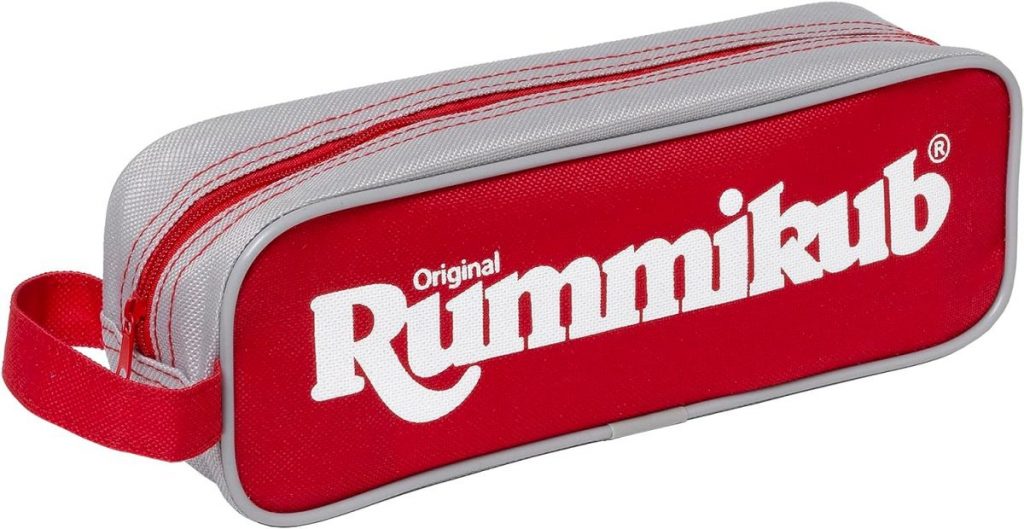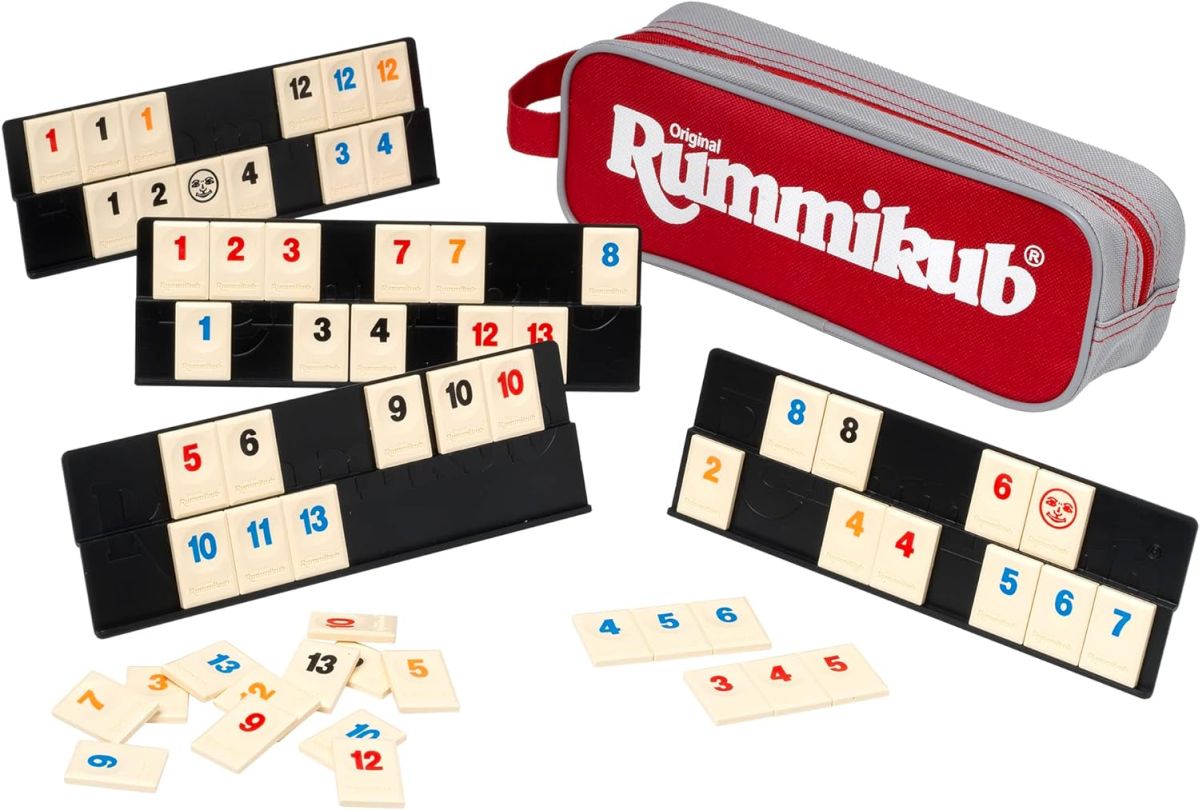Rummikub (pronounced Rummy-cube) is one of those games that seems to have been around forever. Although it was actually invented in the 1940s (by Ephraim Hertzano) it became more mainstream and popular in the 1970s. It now has several variations available including the Rummikub Mini Pouch, travel, word and kid’s versions. Rummikub is a numbers game suitable for 2-4 players, age 7+ and has a playing time of around 20-30 minutes.
If you have ever enjoyed playing the card game Rummy or Gin Rummy, then you will love the Rummikub Mini Pouch – it is basically a tile-based version of the same game. It could be described as a combination of Rummy and the tile matching game Mahjong or even a number version of Scrabble. A fast paced constantly changing game of number tile manipulation and strategy.
In the Rummikub Mini Pouch:
- 106 Tiles (104 Numbers; 8 sets 1-13 in 4 Colours; Black, Blue, Red and Yellow, 2 Jokers)
- 4 Racks and Rack Holders
- Instructions
Rummikub is a tile-based game with the aim of the game to be the first player to get rid of all your tiles by building number groups or runs. It is an easy game to play but requires strategic thinking and careful considered play to win. Now it has jumped out of its big box version and into a much smaller travel-sized mini pouch that makes it a perfect travel game. Whilst a more compact version, it is still the same game that hasn’t compromised on playability.
The Rummikub Mini Pouch is supplied in a red zip-up pouch (about 21cm in length) with a carry handle. It contains the 106 number tiles, 4 racks plus rack holders and instructions. A perfect package that makes it easy to take on your travels to play anywhere!

Before playing Rummikub, I would suggest giving the rules a couple of readthroughs to completely understand them and grasp how to play groups and runs. They are not hard instructions to follow but it might be worth playing a few test rounds to get to grips with the concept and learning the difference between groups, runs and sets, what a meld is and how to manipulate and split tiles that are already in play.
To play, all players take 14 tiles and a tile rack. The tiles are then placed on their tile rack. The remaining tiles are placed face down between the players (these tiles are known as the pool). Once each player has sorted their tiles on their rack, each player selects a new tile from the pool and the player with the highest number starts the game. These tiles are then replaced back in the pool and the tiles mixed up.
To play the game, players must lay down an initial meld. They must place a group or run on the table which has a value at least 30 points (you add up the numbers on the tiles).
- GROUP: A group is a set of 3 or 4 tiles of the same number in different colours (but you can’t have 2 of the same colour).
- RUN: A run is a set of 3 or 4 consecutive number tiles in the same colour (e.g., 1, 2, 3, 4).
If a player is unsuccessful with the initial meld, a new tile must be taken from the pile in the middle of the table and that players turn ends. The next player then must lay 30 points and so on until all players have had a turn.
After the initial meld has been played, going forward each player must play at least 1 tile from their rack. This can be by either adding a new group or run or manipulating one that has already laid (e.g., adding a red 4 to a sequence of red 1, 2, 3 already on the table). If a player is unable play a tile, they must draw one from the pile and add it to their rack with play then continuing with the next player.
The game continues with players laying down or manipulating runs and sets that have already been played to create others, until one player has laid all their tiles on the table and called ”Rummikub”. If you are playing more than one match, the losers add up the values of their remaining tiles and the total of all players scores is given to the winner as a positive score, whilst the loser(s) receive a minus score to the value of their own remaining tiles. After a few games, the player with the overall highest number of points is the winner.
Overall, I love playing Rummikub and the Rummikub Mini Pouch but I do think that it is a Marmite game – a game that you will either love or hate. It is a great game of strategic thinking combined with a small helping of Lady Luck.
I found that the instructions easy to read but they do take more than one readthrough to fully understand the gameplay, especially for the youngest players. If you are more a visual learner, there are some excellent tutorial videos you can watch on YouTube and on the Rummikub website.
It is a slow starting game whilst runs and sets are being built up. But after a few hands have been played and there are more tiles on the table, it does get faster and much more interesting. And the more people playing, the better it is.
With a maximum time of 1 minute per turn, it can get quite quick. This time limit is needed as waiting for another player to go through all the permutations in their head before taking their turn can be a bit tedious and could make the other players lose interest. Although if you are playing with younger players you might want to adapt this for their needs – we played with 1 minute for the adults and 2 minutes for the children.
I found the game to be a fun, interesting and reasonably challenging game that gets you thinking and trying to outsmart your fellow players. It is probably better suited for older children, teenagers and adults rather than 7 and 8 years olds, but it will definitely keep the family entertained.
I do prefer the Rummikub Mini Pouch to the Rummikub Classic big box version as the tiles are not bouncing around all over the place when packed away. Everything is neatly contained in the pouch. The quality of the pieces feel good although the numbers on the tiles are not etched in so may rub off over time (or may not, only time will tell). The tiles are slightly smaller than the classic boxed version, although still a good size to play with and you can very easily see the numbers. The racks are collapsible for easy storage in the durable pouch. Personally I think that it is a more user-friendly version of a classic game.
I enjoy playing Rummikub. It is a fun and challenging game for family and friends and the Rummikub Mini Pouch makes it perfect for taking and playing on your travels.
Rating: 5/5
RRP: £12.99
For more information, visit www.johnadams.co.uk. Available to buy from Amazon here.


